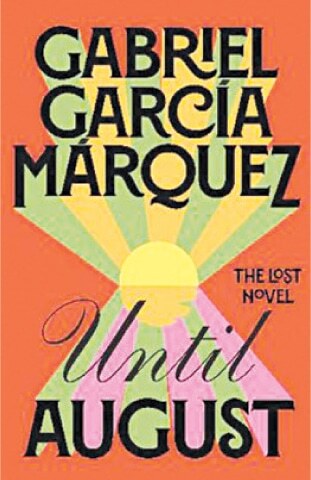Technology
FICTION: BRINGING THE BONES HOME
Until August
By Gabriel Garcia Marquez
Penguin Books
ISBN: 978-1-405-96417-2
Until August is the story of a woman in a man’s world. The late Gabriel Garcia Marquez was a lifelong denouncer of patriarchy. He blamed machismo and oppression of women as a great cultural flaw of Latin America. This is the world from which Anna Magdalena Bach, a 46-year-old married woman with children, strives to escape the double standards, with her disconcerting passions and transgressive sexuality.
Although the novels of Nobel Prize-winning Garcia Marquez are full of developed female characters — from the various mothers, grandmothers, sisters and daughters in his most famous classic One Hundred Years of Solitude to his more lucid Love in the Time of Cholera — Until August is perhaps his only novel with an uncontested female protagonist.
The other unique feature of this posthumous novel is that it is set in modern times. “Many years later, as he faced the firing squad, Colonel Aureliano Buendia was to remember that distant afternoon when his father took him to discover ice.” This most famous opening line of Marquez’s most famous novel clearly implies a bygone era where ice was a marvel. Similarly, most of his other novels are of a pre-modern country. Not so in Until August, which is set in Garcia Marquez’s own contemporary times.
A third unique feature of Until August is that it is incomplete and, according to its author, not worth publishing. “This book doesn’t work,” he told his two sons Rodrigo and Gonzalo Garcia, “it must be destroyed.” In an act of betrayal, however, his two sons decided to “put his readers’ pleasures ahead of all other considerations.” The 120-page novel was finally published in March 2024, after the unfinished manuscript had been lying in Austin, Texas, for over 10 years.
Gabriel Garcia Marquez’s posthumously published, unfinished novella, despite its shortcomings, carries his deep understanding of mankind’s experiences and misadventures
As the novel opens, Ana Magdalena is seen at her mother’s grave, which she has been visiting every year on August 16, laying gladioli flowers down in a cemetery that sits above a small, unnamed island off the coast of Colombia that her mother had asked to be buried in. Ana is happily married and has a good family but, this year, she impulsively decides to seduce a man and take him up to her room.
This sensuous encounter with a silver-haired Spanish gringo changes everything. In the morning when she wakes up in the hotel, she finds her lover gone and a $20 bill left in the book she was reading. The bill burns “like a live coal, less in her purse than in her heart,” writes Garcia Marquez.
When she returns home to her husband in Colombia, she sees her life through completely new “chastened” eyes. Something in that $20 saps Ana Magdalena’s ability to pretend and she now feels like a stranger in her own family. She feels humiliated at being treated as a common prostitute. She renews smoking and starts to suffer from insomnia.
Her husband notices the change in her behaviour. He tells her point blank, “it is impossible for me not to notice how different you have become.” However, she continues to visit her mother’s grave and seeks new lovers every August 16. After one of these visits to the island, she finally breaks down and challenges her husband and demands to know the truth of his sex life.
Finally, on her next visit, she discovers that, all along, her mother has had another visitor, a man in his seventies, who had left “heaps of expensive flowers” on her grave. In other words, her mother had a lover on the island with whom she had a life-long romance and that is why she had asked to be buried there. That night, Ana fails to bring a lover to her hotel room. She sobs through the night, “furious with herself for the disgrace of being a woman in a man’s world.”
Abruptly, she decides that she needs to exhume her mother and take her mother’s bones home. Confronted by the bones, Ana sees herself in the casket and feels that they are one and the same. She leaves the island for good, with a bag of her mother’s bones, with a new understanding between mother and daughter, from beyond the grave.
When Until August was published, it created a huge controversy. According to The New York Times, “Until August, nimbly translated by Anne McLean, is a microscopic story, its contents hardly sufficient for it to be called a novella, much less a finished novel. Reading it may provoke unhealthy levels of frustration in those familiar with Garcia Marquez’s most indelible creations… It is a bit like watching a great dancer, well past his prime. Now its literary guardians have put in front of the world the indignity of Garcia Marquez imitating himself.”
I agree that this unfinished novel is flawed in later chapters and has an abrupt ending, but the writing of Garcia Marquez is still flawless in most parts. Yes, it is not Madame Bovary. Nevertheless, part one of the novel exhibits outstanding aspects of Marquez’s work: his capacity for invention, his poetic use of language, his captivating storytelling and his deep understanding of mankind’s experiences and misadventures. Had he lived a little longer and not suffered from dementia, I am sure he would have given depth to this novel.
As I quoted Marquez when I reviewed his autobiography Living to Tell the Tale in these pages: “Life is not what one lives but what one remembers. Without memory, there is nothing.” Publishing this novel for Marquez’s millions of loyal readers across the globe, his sons are bringing his bones home.
The reviewer is a retired diplomat and a former editor living in Washington DC For further information please see his website: www.javedamir.com
Published in Dawn, Books & Authors, October 26th, 2025
Until August
By Gabriel Garcia Marquez
Penguin Books
ISBN: 978-1-405-96417-2
Until August is the story of a woman in a man’s world. The late Gabriel Garcia Marquez was a lifelong denouncer of patriarchy. He blamed machismo and oppression of women as a great cultural flaw of Latin America. This is the world from which Anna Magdalena Bach, a 46-year-old married woman with children, strives to escape the double standards, with her disconcerting passions and transgressive sexuality.
Although the novels of Nobel Prize-winning Garcia Marquez are full of developed female characters — from the various mothers, grandmothers, sisters and daughters in his most famous classic One Hundred Years of Solitude to his more lucid Love in the Time of Cholera — Until August is perhaps his only novel with an uncontested female protagonist.
The other unique feature of this posthumous novel is that it is set in modern times. “Many years later, as he faced the firing squad, Colonel Aureliano Buendia was to remember that distant afternoon when his father took him to discover ice.” This most famous opening line of Marquez’s most famous novel clearly implies a bygone era where ice was a marvel. Similarly, most of his other novels are of a pre-modern country. Not so in Until August, which is set in Garcia Marquez’s own contemporary times.
A third unique feature of Until August is that it is incomplete and, according to its author, not worth publishing. “This book doesn’t work,” he told his two sons Rodrigo and Gonzalo Garcia, “it must be destroyed.” In an act of betrayal, however, his two sons decided to “put his readers’ pleasures ahead of all other considerations.” The 120-page novel was finally published in March 2024, after the unfinished manuscript had been lying in Austin, Texas, for over 10 years.
Gabriel Garcia Marquez’s posthumously published, unfinished novella, despite its shortcomings, carries his deep understanding of mankind’s experiences and misadventures
As the novel opens, Ana Magdalena is seen at her mother’s grave, which she has been visiting every year on August 16, laying gladioli flowers down in a cemetery that sits above a small, unnamed island off the coast of Colombia that her mother had asked to be buried in. Ana is happily married and has a good family but, this year, she impulsively decides to seduce a man and take him up to her room.
This sensuous encounter with a silver-haired Spanish gringo changes everything. In the morning when she wakes up in the hotel, she finds her lover gone and a $20 bill left in the book she was reading. The bill burns “like a live coal, less in her purse than in her heart,” writes Garcia Marquez.
When she returns home to her husband in Colombia, she sees her life through completely new “chastened” eyes. Something in that $20 saps Ana Magdalena’s ability to pretend and she now feels like a stranger in her own family. She feels humiliated at being treated as a common prostitute. She renews smoking and starts to suffer from insomnia.
Her husband notices the change in her behaviour. He tells her point blank, “it is impossible for me not to notice how different you have become.” However, she continues to visit her mother’s grave and seeks new lovers every August 16. After one of these visits to the island, she finally breaks down and challenges her husband and demands to know the truth of his sex life.
Finally, on her next visit, she discovers that, all along, her mother has had another visitor, a man in his seventies, who had left “heaps of expensive flowers” on her grave. In other words, her mother had a lover on the island with whom she had a life-long romance and that is why she had asked to be buried there. That night, Ana fails to bring a lover to her hotel room. She sobs through the night, “furious with herself for the disgrace of being a woman in a man’s world.”
Abruptly, she decides that she needs to exhume her mother and take her mother’s bones home. Confronted by the bones, Ana sees herself in the casket and feels that they are one and the same. She leaves the island for good, with a bag of her mother’s bones, with a new understanding between mother and daughter, from beyond the grave.
When Until August was published, it created a huge controversy. According to The New York Times, “Until August, nimbly translated by Anne McLean, is a microscopic story, its contents hardly sufficient for it to be called a novella, much less a finished novel. Reading it may provoke unhealthy levels of frustration in those familiar with Garcia Marquez’s most indelible creations… It is a bit like watching a great dancer, well past his prime. Now its literary guardians have put in front of the world the indignity of Garcia Marquez imitating himself.”
I agree that this unfinished novel is flawed in later chapters and has an abrupt ending, but the writing of Garcia Marquez is still flawless in most parts. Yes, it is not Madame Bovary. Nevertheless, part one of the novel exhibits outstanding aspects of Marquez’s work: his capacity for invention, his poetic use of language, his captivating storytelling and his deep understanding of mankind’s experiences and misadventures. Had he lived a little longer and not suffered from dementia, I am sure he would have given depth to this novel.
As I quoted Marquez when I reviewed his autobiography Living to Tell the Tale in these pages: “Life is not what one lives but what one remembers. Without memory, there is nothing.” Publishing this novel for Marquez’s millions of loyal readers across the globe, his sons are bringing his bones home.
The reviewer is a retired diplomat and a former editor living in Washington DC For further information please see his website: www.javedamir.com
Published in Dawn, Books & Authors, October 26th, 2025




